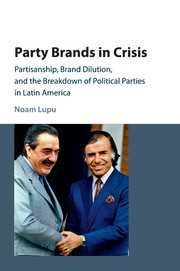 Party Brands in Crisis
Party Brands in Crisis Book contents
- Frontmatter
- Dedication
- Contents
- List of figures
- List of tables
- Acknowledgments
- 1 Why do parties break down?
- 2 Brand dilution and party breakdown
- 3 Explaining party breakdown across Latin America
- 4 Argentina: Peronism survives, Radicals collapse
- 5 Venezuela: AD and COPEI break down
- 6 Party brands and mass partisanship: experimental evidence
- 7 Party brands and mass partisanship in comparative perspective
- 8 Parties, partisanship, and democracy: conclusions
- Appendix
- Bibliography
- Index
3 - Explaining party breakdown across Latin America
Published online by Cambridge University Press: 18 December 2015
- Frontmatter
- Dedication
- Contents
- List of figures
- List of tables
- Acknowledgments
- 1 Why do parties break down?
- 2 Brand dilution and party breakdown
- 3 Explaining party breakdown across Latin America
- 4 Argentina: Peronism survives, Radicals collapse
- 5 Venezuela: AD and COPEI break down
- 6 Party brands and mass partisanship: experimental evidence
- 7 Party brands and mass partisanship in comparative perspective
- 8 Parties, partisanship, and democracy: conclusions
- Appendix
- Bibliography
- Index
Summary
Why have a quarter of Latin America's established parties collapsed in recent years? Perhaps they were simply unlucky, as many scholars suggest: they governed at times of economic crisis and simply fell afoul of public opinion. Or perhaps their downfall was an unintended consequence of the economic and institutional reforms they themselves passed, as others argue.
Both answers are partially right. The international economic environment of the 1980s and 1990s severely limited the policy options of leaders around the world, and frequent international economic crises also weakened many Latin American incumbents. But running for reelection on the heels of an economic crisis was not enough to cause an established party's total breakdown. Although many suffered serious electoral losses, they often lived to fight another day. Similarly, economic reforms in and of themselves did not always hurt incumbent parties electorally. When the reforms succeeded, incumbents were often rewarded at the polls.
It is the way economic reform was often pursued that made parties susceptible to collapse. During the 1980s and 1990s, leaders across the region implemented policies that were inconsistent with their traditional party brand, provoked intraparty conflicts, and formed strange-bedfellow alliances with historic rivals. These behaviors diluted the brands of their parties, eroding voters' attachments to them.Without the assured support of partisans, governing parties became more susceptible to negative valence evaluations and, when confronted with new economic crises, broke down.
Empirically testing this proposition across the region requires abstracting away from the specifics of the argument. Figures on voter partisanship are simply not available for most Latin American democracies for most of this time period. Nor do we have sufficient data on voters' evaluations of their leaders' economic performance. Moreover, reliable cross-national data on party politics in the region are far from perfect. So any region-wide analysis of these hypotheses can only be considered suggestive. Nevertheless, a comparative analysis of the whole region can tell us whether behaviors that dilute party brands and economic crises generally correlate with party breakdown. On its own, finding such a relationship would not compellingly establish the validity of my argument, but it would be a suggestive first step in the process of hypothesis-testing.
A region-wide comparative analysis can also help us determine whether the explanations put forward by prior studies generalize across the region. Do parties become more susceptible to breakdown in the wake of political decentralization?
- Type
- Chapter
- Information
- Party Brands in CrisisPartisanship, Brand Dilution, and the Breakdown of Political Parties in Latin America, pp. 42 - 58Publisher: Cambridge University PressPrint publication year: 2016


